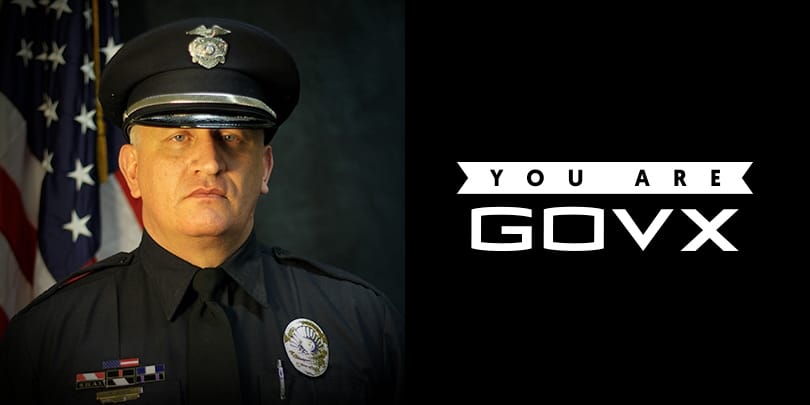Detective Matthew Adams keeps his grandfather’s old shields and retirement revolver in a shadow box at his house. Back in the 60s, his grandfather was Chief of Detectives in Kansas City, and Matt keeps a KCPD call box key on his key ring. He followed in his grandfather’s footsteps when he became a cop 24 years ago, and a detective just four years into his career.
He’ll be the first one to tell you that being a detective is nothing like you see in the movies. But even with the mountains of paperwork as opposed to non-stop action, he’ll also tell you he enjoys just about every moment of it.
“Being a detective is like playing chess,” he says. “Halfway through the game, you know what’s happened up until that point, and you just need to consider your next move.”
About a decade ago, Matt investigated a case in the Denver area. There was a complex with about 10 people from Eastern Europe living in a tiny one-bedroom apartment. Every one of them had a student visa, and all worked at a hotel in the city. The company they worked for provided housekeeping services to the hotels.
The apartment’s rent was $1,000 a month. But every person living there was paying the full $1,000. Who was collecting the money? Where were the checks going?
It looked suspicious.
It was hard to get the men to talk, and not just due to the language barrier. In their home countries, police are not to be trusted. Especially when you may or may not have tenuous ties to shady criminal elements.
So, Matt kept digging. His investigation took him around the Denver metro area, where nightclubs attracted business from tourists and locals alike. The cleaning company the apartment dwellers worked for was apparently connected to dozens of women working as “dancers” in the clubs. When Matt continued to question the company owners, one of them actually asked him, “Why do you care about the slaves?”
The Euro guys’ names popped up on the federal government’s radar. This was bigger than Matt had anticipated. Dealing with international crime has a way of raising the hairs on the back of your neck. “My wife was a little freaked out,” he said. “Organized crime groups don’t exactly like cops poking around.” Matt started taking alternate streets home from work for a while, randomizing the route in case anyone was following him.
Eventually, the feds started to arrest people. Human trafficking, money laundering … over 120 indictments for everyone involved. But the best part? Matt got to arrest the last man standing. During Matt’s investigation, he came across a restaurant one of the men liked to frequent. As the feds were rounding people up, Matt got a call from the restaurant’s manager and told him the man he was looking for had stopped in for lunch. Matt strolled in, found the guy tucking into his meal and interrupted his lunch with a pair of handcuffs. Turns out he was one of the higher-ranking guys.
It was bittersweet, however. Since the case turned federal, Matt didn’t get a clear picture of the conclusion. He knows some of the men were deported back to their home countries. As for the girls in the nightclubs? Matt can only guess.
Human trafficking, money laundering … over 120 indictments for everyone involved. But the best part? Matt got to arrest the last man standing.
Being on the job for over 20 years has a way of hardening a person. Matt is 52 years old and still serves on the SWAT team for his department. One day, Matt and some of his coworkers tracked down a felon wanted for robbery and murder at a hotel. (“These assholes always have their girlfriends rent rooms for them, as if we can’t figure out who’s really staying there.”) They’d quietly cleared the hotel of guests and prepared to break in the suspect’s door when they heard a gunshot. They found the suspect with a hole in his head, and that was that.
That’s the kind of stuff Matt leaves at the office. “I don’t want that world in my house,” he says. “Sometimes you have to not be a cop. Some guys like to be ‘on’ all the time, but that’s not me.”
Matt keeps his two worlds separate. When he’s at the office, he’s a detective. When he’s home, he’s a regular guy. He exercises, spends time with his wife, and goes to his kids’ sporting events, and in his spare time he likes to dabble in the science of forecasting, putting his brain to work predicting the likelihood of future events. Pop culture knows the hobby as “super forecasting.”
And he is a fencer. As a kid, he boxed and wrestled, tried out Russian martial arts when he was older, and ultimately found the sword-and-strategy sport of fencing to his liking. “There’s a bit of a handshake between fencing and detective work,” he says.
“You just have to take care of one thing at a time. Most of the time, you know who did it, but you don’t know how you’re going to prove it. So instead of focusing on ‘how am I going to get 15 points on my opponent,’ you ask ‘how am I going to get the next point?’ That’s the way to think about it.”

Related articles:
